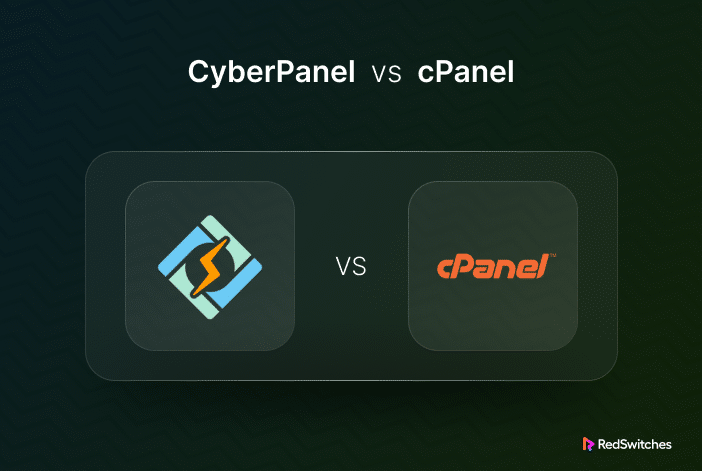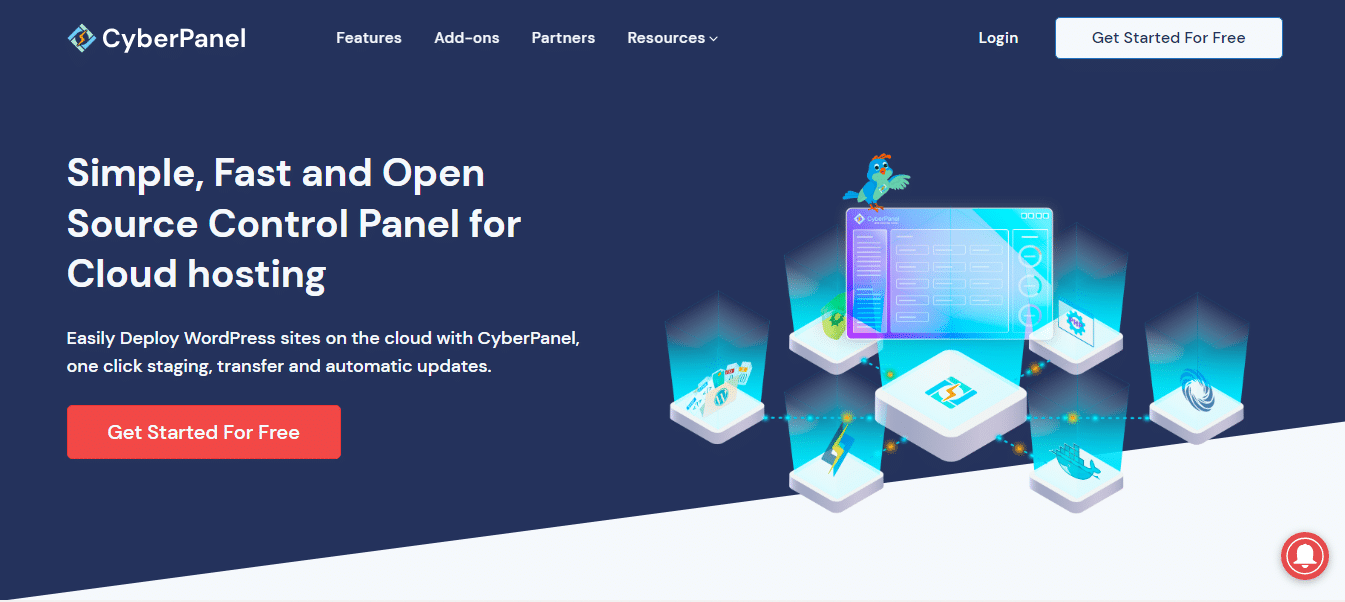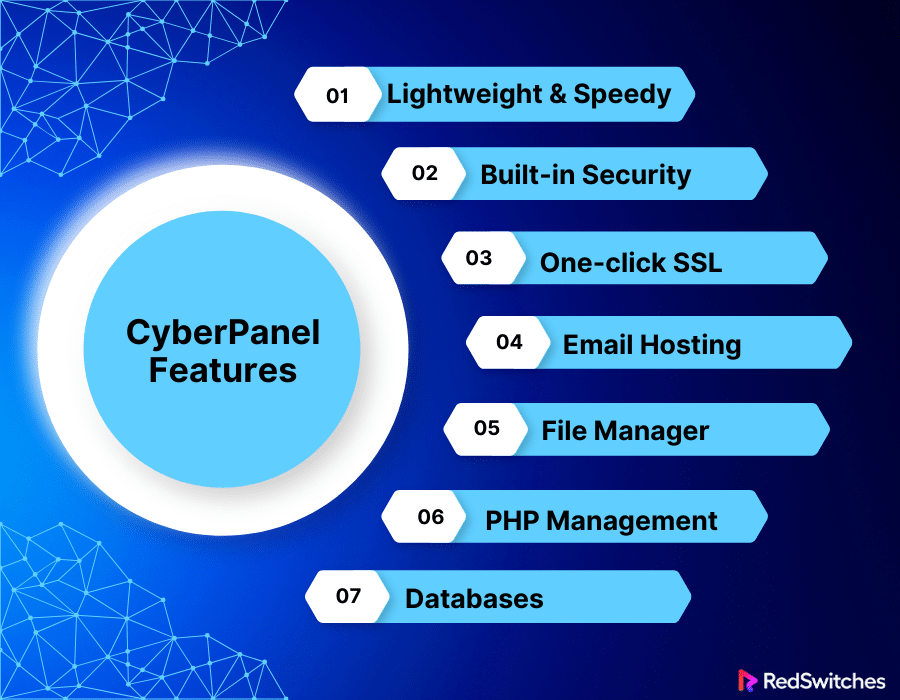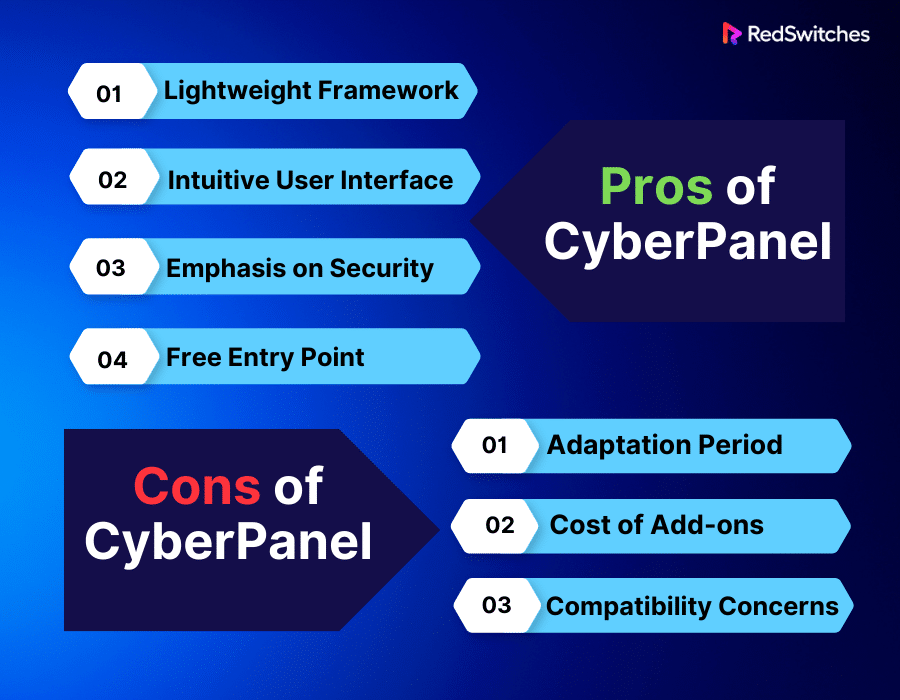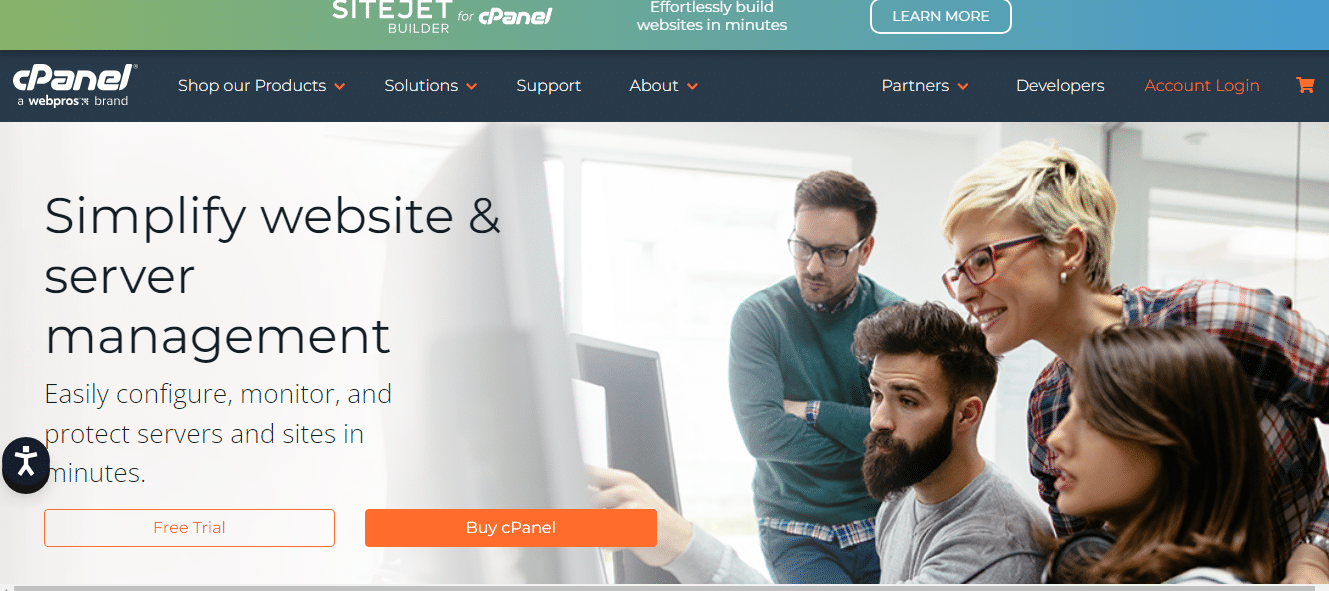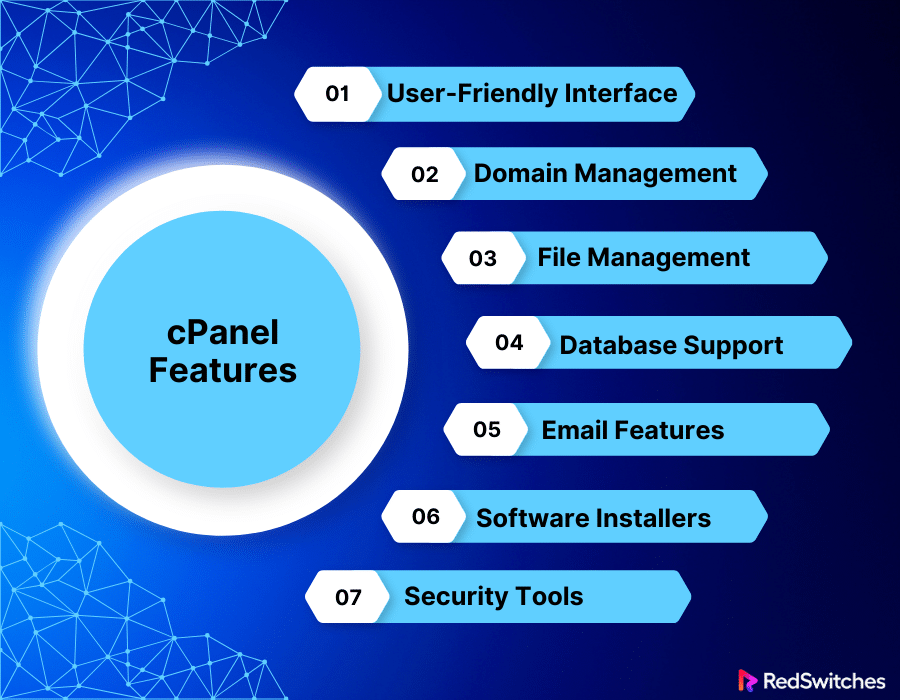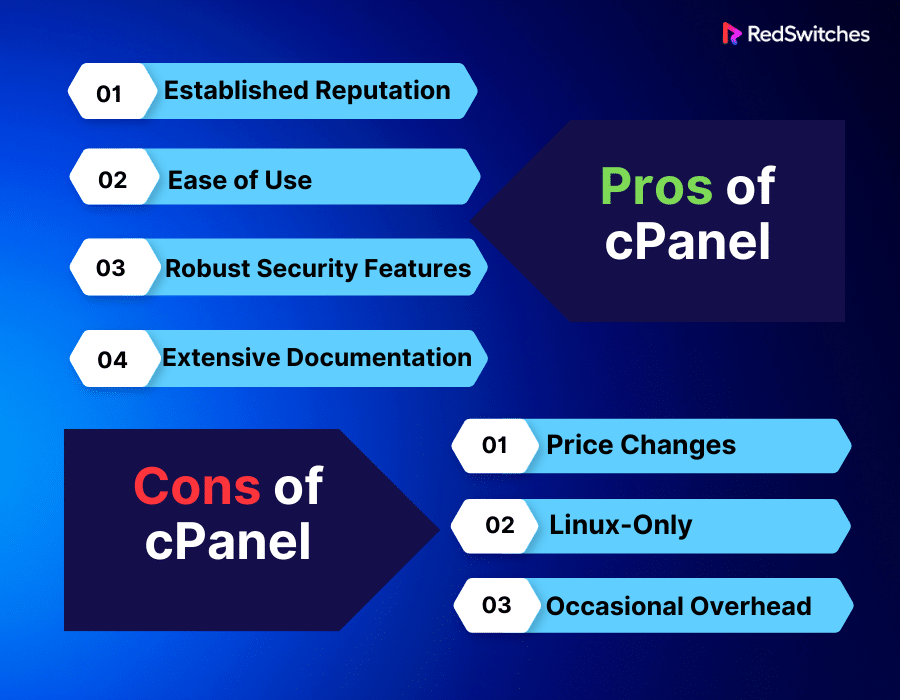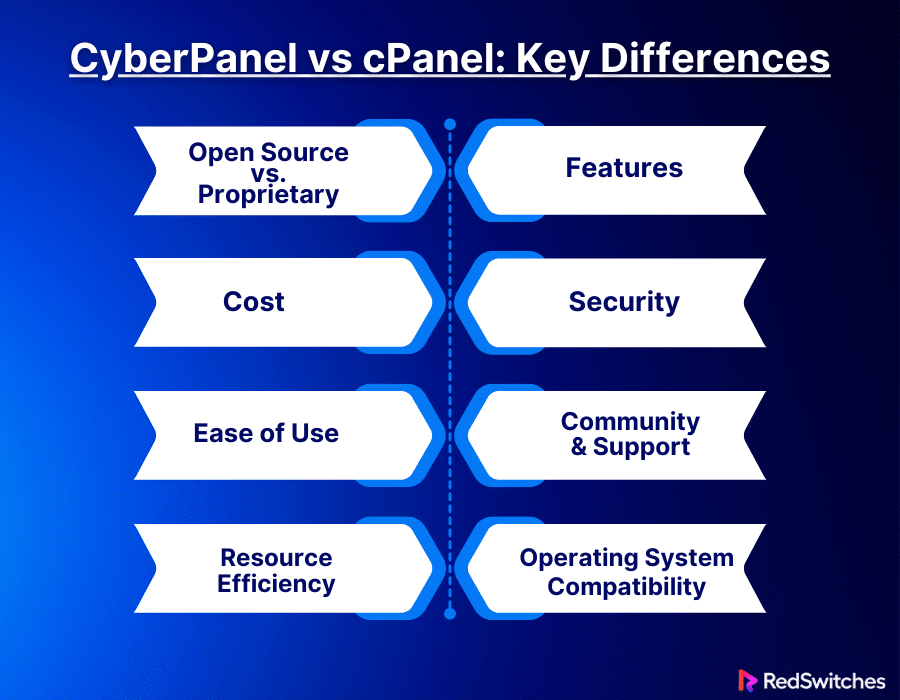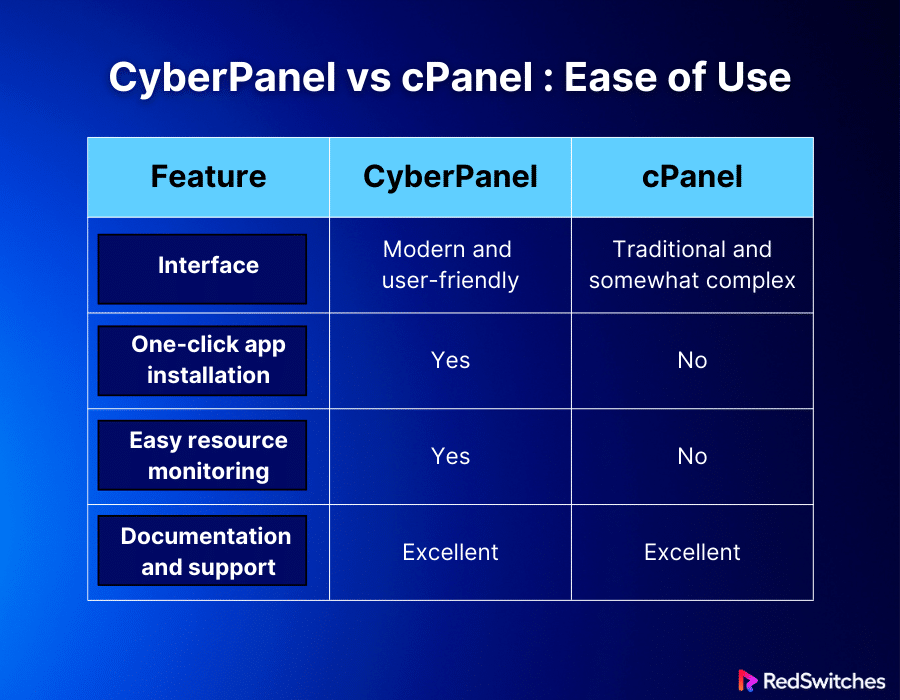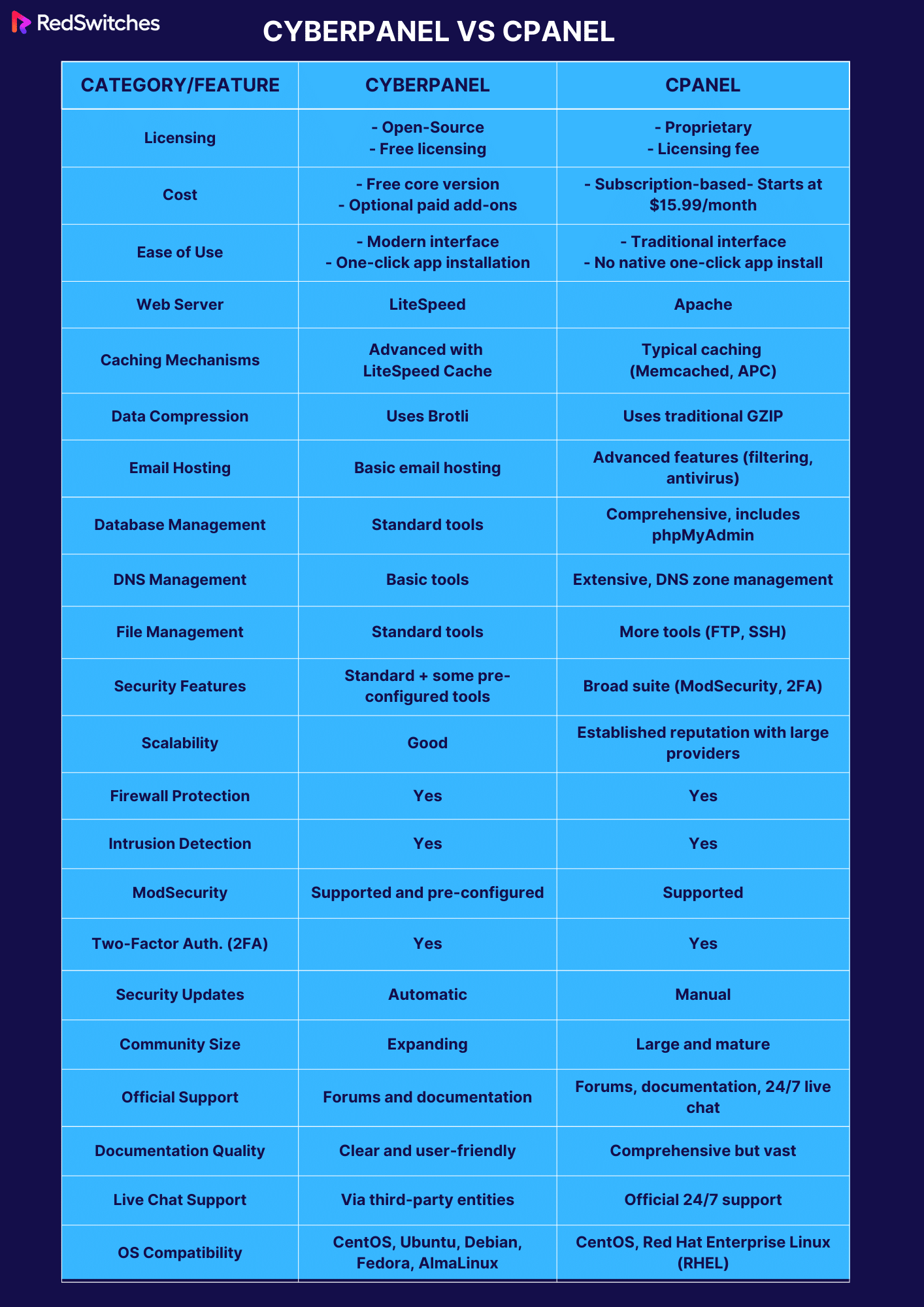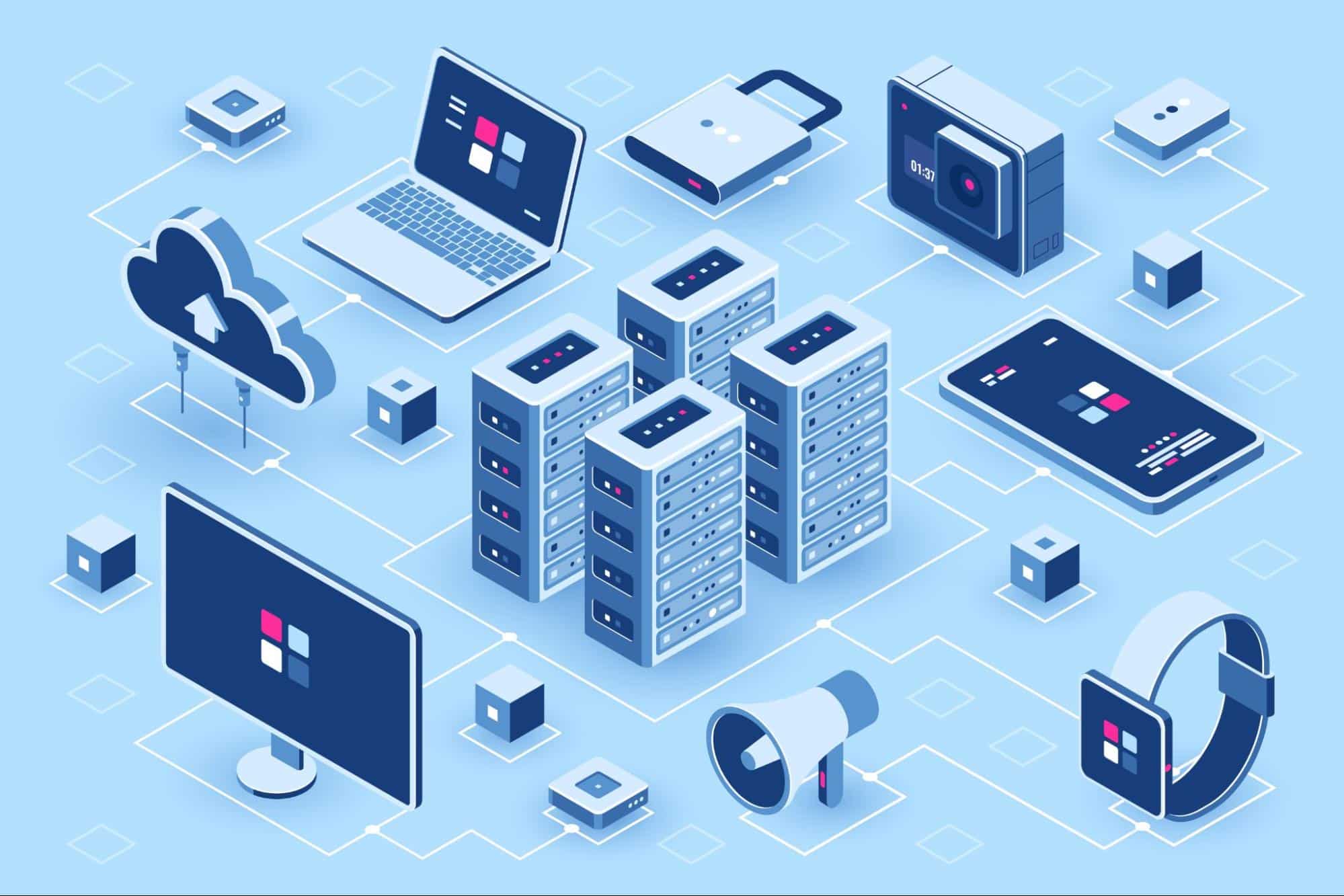In today’s dynamic digital landscape, the battle for the best web hosting control panel is fiercer than ever. Among the leading contenders are CyberPanel and cPanel, two titans that dominate the market with their unique offerings. But how do they measure up against each other? In the great debate of “CyberPanel vs cPanel,” many nuances set them apart.
Understanding these distinctions is paramount whether you’re an experienced web developer or a beginner.
In this article, we’ll unveil 8 crucial differences between CyberPanel and cPanel, providing comprehensive insights to make an informed decision. Let’s dive in!
Table of Contents
- What is CyberPanel?
- What is cPanel?
- CyberPanel vs cPanel: Key Differences
- cPanel vs CyberPanel: Which Web Hosting Control Panel to Pick?
- Conclusion
- FAQs
What is Cyberpanel?
Credit: CyberPanel
In the digital realm, a web hosting control panel is the nerve center for managing web hosting operations. Among the contenders in this arena, CyberPanel has carved out its niche. CyberPanel is a modern web hosting control panel powered by OpenLiteSpeed, designed to provide streamlined operations, high performance, and enhanced website security.
Unlike traditional control panels, CyberPanel focuses on delivering content more efficiently by leveraging the capabilities of the OpenLiteSpeed server, ensuring that users get the best of both speed and stability.
As we dive deeper, we will uncover the myriad features, add-ons, and versions that make CyberPanel a preferred choice for many.
CyberPanel Features
CyberPanel offers a plethora of features aimed at simplifying the web hosting process:
- Lightweight & Speedy: Harnessing the power of OpenLiteSpeed, CyberPanel promotes swift web server solutions, greatly improving site load times and performance.
- Built-in Security: CyberPanel’s core is built around ModSecurity integration, which ensures rigorous protection against potential threats and brute force assaults.
- One-click SSL: A streamlined process is in place to help users install SSL certificates for their domains, safeguarding data transmissions.
- Email Hosting: Beyond hosting websites, CyberPanel provides a robust email hosting platform equipped with Rainloop webmail.
- File Manager: This integrated tool makes website file management and editing a breeze.
- PHP Management: CyberPanel allows users to choose from various PHP versions, catering to diverse website requirements.
- Databases: The support for MariaDB assures seamless database operations and optimal backend functionality.
CyberPanel Add-ons
CyberPanel isn’t just about its core functionalities. It’s supplemented with a suite of add-ons to elevate its prowess:
- Cloud Backups: Integration capabilities extend to renowned cloud services such as Amazon S3, facilitating scheduled automatic backups.
- WordPress Manager: Tailored for WordPress aficionados, this tool simplifies installations, cloning, and staging operations.
- Imunify360 Integration: Imunify360 integration offers advanced firewall and malware scanning solutions for those prioritizing security.
- LiteSpeed Cache: A premium caching solution ensures web pages are delivered to users quickly.
CyberPanel Free Vs Enterprise Version
CyberPanel offers both a free and an enterprise version, catering to a broad spectrum of needs:
- Free Version:
- Empowered by OpenLiteSpeed.
- Standard firewall with basic DDoS protection.
- A liberty to host unlimited domains.
- Enterprise Version:
- Supercharged with the LiteSpeed Enterprise Web Server, boasting additional features and optimizations.
- Premium DDoS protection and advanced firewall configurations.
- Prioritized premium support ensures swift resolution of any encountered issues.
Pros and Cons of CyberPanel
Every software has its strengths and weaknesses, and CyberPanel is no exception.
Pros:
- Lightweight Framework: Integrating with OpenLiteSpeed ensures optimal performance without overwhelming server resources.
- Intuitive User Interface: A modern, user-friendly design that even newcomers can easily navigate.
- Emphasis on Security: From its core ModSecurity to effortless SSL installations, CyberPanel doesn’t compromise on security.
- Free Entry Point: A comprehensive free version offers a robust starting point for newcomers or those on a budget.
Cons:
- Adaptation Period: Those transitioning from other panels like cPanel may face a learning curve.
- Cost of Add-ons: Some advanced functionalities have an additional price tag.
- Compatibility Concerns: While rare, specific software integrations might be smoother on older, more established panels.
To wrap up, CyberPanel, focusing on efficiency, security, and user experience, is a formidable option in the web hosting control panel sector. Whether you’re a seasoned developer or just starting out, understanding its offerings can help you make an informed decision.
What is Cpanel?
Credit: cPanel
In web hosting control panels, few names resonate as prominently as cPanel. Established in the late 1990s, cPanel has grown to become the gold standard for web hosting management solutions.
cPanel is an online Linux-based web hosting control panel with a graphical interface and automation tools to simplify website hosting. Its intuitive design, combined with a rich feature set, has made it a favorite among hosting providers and website owners alike.
Designed for those who may not be tech-savvy but still want control over their web presence, cPanel has bridged the gap between ease of use and powerful functionality. Let’s explore its features, add-ons, pricing models, and the benefits and drawbacks of choosing cPanel.
cPanel Features
cPanel comes packed with a plethora of features, making web hosting management a streamlined experience:
- User-Friendly Interface: cPanel’s graphical interface is designed for ease of use, allowing users to manage their web properties without requiring deep technical knowledge.
- Domain Management: Users can easily manage multiple domains, sub-domains, and redirects.
- File Management: Through the built-in File Manager, users can upload, edit, and backup their website files with ease.
- Database Support: Provides robust support for MySQL and PostgreSQL databases, with tools like phpMyAdmin for database management.
- Email Features: Create and manage email accounts, set up forwarders, and enable spam filters.
- Software Installers: One-click installations for a myriad of software, including WordPress, Joomla, and Drupal, via tools like Softaculous.
- Security Tools: Integrated security features like IP blocker, SSL/TLS manager, and Hotlink protection.
cPanel Add-ons
cPanel’s functionality can be extended with various add-ons, enhancing its capabilities:
- CloudLinux: Improves server security, stability, and density by isolating each tenant in their own environment.
- JetBackup: Offers automated backups, allowing users to create backup schedules and restore points.
- SitePad Website Builder: A drag-and-drop website builder with over 300 responsive templates.
- ImunifyAV: An advanced malware scanner that checks for malware signatures and can automatically remove them.
- KernelCare: Provides automated kernel updates without rebooting the server, ensuring optimal uptime.
cPanel Free vs Paid:
Unlike some control panels, cPanel does not have a permanently free version. Still, its pricing is based on different models:
- Free Trial: Some hosting providers may offer a limited-time free trial of cPanel for users to get a feel for its features.
- Solo: Aimed at single users or small projects, supporting one domain/account.
- Admin: Designed for smaller hosting setups, supporting up to 5 accounts.
- Pro: Suitable for medium-sized hosting businesses, supporting up to 30 accounts.
- Premier: Built for larger hosting environments, supporting over 100 accounts and tiered pricing beyond that.
Pros and Cons of cPanel
As with any software, cPanel comes with its own advantages and drawbacks.
Pros:
- Established Reputation: With decades in the industry, cPanel is tried, tested, and trusted by millions worldwide.
- Ease of Use: Its intuitive graphical interface ensures even those new to web hosting can navigate confidently.
- Robust Security Features: Built-in security tools provide a fortified environment against potential threats.
- Extensive Documentation: A vast library of tutorials, guides, and community forums to assist users.
Cons:
- Price Changes: There have been notable price hikes over the years, causing concerns among long-term users and hosting providers.
- Linux-Only: cPanel is exclusive to Linux, meaning Windows server users must look elsewhere.
- Occasional Overhead: On smaller servers or VPS, cPanel might consume a significant portion of available resources.
In summation, cPanel’s enduring presence in the web hosting control panel market is no accident. Its simplicity, power, and reliability blend have made it a staple for many. Whether you’re a hosting veteran or a budding web entrepreneur, understanding what cPanel offers can aid in making the right hosting management choice.
CyberPanel vs cPanel: Key Differences
In the bustling arena of web hosting control panels, the debate between CyberPanel and cPanel is captivating. Both titans offer a unique blend of features and functionalities tailored to cater to a diverse audience. But beneath their user-friendly interfaces and robust tools lies a tapestry of differences that set them apart.
Understanding these distinctions becomes imperative as you enter the “CyberPanel vs cPanel” discussion. This section will unravel the critical differences between the two, paving the way for an informed choice in your web hosting journey. Let’s embark on this comparative exploration!
Open Source vs. Proprietary
Diving into the web hosting control panels domain often leads users into the “CyberPanel vs cPanel” arena. This isn’t just a clash of features and interfaces but a broader debate between open-source and proprietary ideologies. In this section, we’ll explore these two giants from the prism of their foundational principles, shedding light on what makes each unique and why they might appeal to different user segments.
Open Source Versus Proprietary: A Brief Overview
Before diving into the specifics of CyberPanel and cPanel, it’s essential to distinguish between open-source and proprietary models.
- Open Source: Refers to software that is easily accessible, allowing individuals to view, modify, and distribute the software’s source code. This model fosters community collaboration and often results in rapid advancements and increased security due to its transparency.
- Proprietary: This represents software where the original source code is not openly accessible. An individual or a company owns it, and users typically have to pay for its usage. Proprietary software tends to have dedicated teams for updates, support, and security patches, ensuring a consistent and polished product.
CyberPanel: The Open-Source Prodigy
CyberPanel, built on the open-source ideology, offers a fresh perspective in the control panel realm:
- Licensing and Cost: Being open-source, CyberPanel is free for users, enabling them to both utilize and modify it without any licensing costs.
- Flexibility and Customization: The open-source nature means users can tailor CyberPanel to their specific needs, a luxury often unavailable in proprietary solutions.
- Community Involvement: CyberPanel benefits from a vast and active community that constantly contributes to its improvement. This results in a dynamic environment where updates and new features continually evolve.
- Transparency and Security: An open-source framework implies complete transparency. This often leads to enhanced security since the community can swiftly spot and patch vulnerabilities.
Credit: Freepik
cPanel: The Proprietary Pioneer
cPanel has dominated the control panel market for decades thanks to its proprietary approach:
- Licensing and Cost: Being a proprietary tool, cPanel comes with a licensing fee. Users pay for the premium experience, regular updates, and official support.
- Consistency and Reliability: Proprietary software like cPanel often offers a more consistent and detailed user experience. Regular updates ensure that the software remains bug-free and optimized.
- Dedicated Support: Unlike many open-source tools, cPanel provides dedicated customer support, ensuring users have assistance whenever they face issues.
- Integrated Ecosystem: cPanel often seamlessly integrates with other tools and services, thanks to formal partnerships and business agreements, ensuring a smooth hosting experience.
In the “CyberPanel vs cPanel” debate, your choice hinges on your priorities. If you value flexibility, customization, and community-driven development, CyberPanel’s open-source model might resonate with you. On the other hand, if you seek consistency, detailed experience, and dedicated support, cPanel’s proprietary nature holds the upper hand. Each represents a paradigm with its strengths and challenges; the key lies in identifying which aligns best with your web hosting journey.
Want to dive into CyberPanel? Check out our comprehensive guide on how to install CyberPanel on Ubuntu.
Cost
The financial aspect of choosing a web hosting control panel is crucial for many users, especially those starting out or running on a tight budget. In the “CyberPanel vs cPanel” conversation, cost becomes a pivotal point of discussion. Both control panels offer remarkable features, but their pricing structures differ. Let’s dissect their costs and see what each has to offer.
CyberPanel: The Economical Choice
CyberPanel champions the free-to-use mantra, making it an enticing option for many:
- Basic Licensing: CyberPanel’s core version is free. This is not a limited-time offer or a trial; it’s a fully functional control panel without any initial costs.
- Optional Add-ons: While the fundamental features of CyberPanel are gratis, users can enhance their experience by purchasing specific add-ons. Notably, there’s an associated cost for those wanting to integrate with LiteSpeed Enterprise. However, these add-ons are optional, ensuring users can scale according to their requirements and budget.
cPanel: The Premium Experience
cPanel, with its rich history and comprehensive feature set, operates on a subscription-based model:
- Subscription Tiers: cPanel’s pricing is structured around the number of accounts you intend to manage and the desired features. An essential cPanel subscription, accommodating up to 100 accounts, commences at $15.99 monthly.
- Robust Features: While the initial investment might seem steep, compared to CyberPanel’s free offering, cPanel justifies its price tag with a robust set of tools, dedicated support, and consistent updates.
Making the Right Choice for Your Budget
At a glance, the financial comparison seems straightforward:
- CyberPanel: Free, with optional paid enhancements.
- cPanel: Subscription-based, starting at $15.99 monthly.
However, the choice isn’t merely about upfront costs. It’s essential to factor in the value derived, potential scalability costs, and the specific needs of your projects. CyberPanel’s surge in popularity is undoubtedly influenced by its cost-effective model, making it a favorite among startups and individual developers. Yet, cPanel’s premium price often comes with a seamless, refined experience that many seasoned professionals and businesses appreciate.
Curious about how InterWorx stacks up against cPanel? Dive into our detailed comparison of InterWorx and cPanel.
Ease of Use
In the digital age, the intuitiveness and simplicity of a software interface play pivotal roles in user adoption and retention. As people delve into the “CyberPanel vs cPanel” debate, ease of use emerges as a significant point of contention. With varied interfaces and feature sets, both control panels cater to different user preferences. Let’s unravel how they stack up against each other regarding user-friendliness.
A Comparative Snapshot
Presented below is a concise table comparing the user-friendliness attributes of CyberPanel and cPanel:
From this, it’s evident that while both platforms boast stellar documentation and support, CyberPanel takes the lead regarding modern interface design and some user-centric features.
Delving into the User Experience
Let’s explore some salient points that highlight the ease of use of CyberPanel compared to cPanel:
- One-click App Installation: CyberPanel has prioritized user convenience by facilitating effortless installations of prevalent web apps like WordPress, Joomla, and Drupal. This streamlined process contrasts with cPanel, which, while robust, doesn’t natively offer this one-click installation feature.
- Resource Monitoring: CyberPanel’s interface provides users with an intuitive dashboard for keeping tabs on critical server resources like CPU, memory, and disk usage. This feature, although fundamental, is conspicuously absent in cPanel.
- File Management: CyberPanel opts for a contemporary, straightforward file management system, reducing the learning curve for new users. In contrast, cPanel’s file manager, enriched with features, leans more toward a traditional design, which might seem intricate to some.
Who Should Opt for CyberPanel?
CyberPanel, emphasizing a streamlined and modern experience, emerges as the frontrunner for those new to the world of web hosting. Its intuitive design and user-friendly features make the web hosting journey more accessible and less daunting.
Whether you’re a budding developer, a startup, or someone taking their first steps in web management, CyberPanel’s user-centric approach ensures that you spend less time grappling with complexities and more time realizing your digital aspirations.
In summary, the “CyberPanel vs cPanel” ease-of-use debate leans in favor of CyberPanel for its modernity and user-first design. However, it’s essential to remember that the best control panel ultimately aligns with individual needs and familiarity.
Ready to Elevate Your WordPress Experience? Check Out Our 9-Point Guide to Choosing the Best Hosting Service. Click Here to Learn More!
Resource Efficiency
When diving into the world of web hosting control panels, it isn’t just about the tools they offer or the ease of use; it’s also about how they handle resources. Efficient resource utilization can directly impact a website’s performance, cost, and overall user experience.
In the perennial debate of “CyberPanel vs cPanel,” a significant differentiator that emerges is their respective efficiencies in managing server resources.
Unpacking the Efficiency of CyberPanel
CyberPanel’s reputation as a resource-efficient platform isn’t by accident; it’s a result of its foundational architecture and integrated features:
- Underlying Web Server: CyberPanel’s core is built atop the LiteSpeed web server, renowned for its ability to handle high traffic with minimal resource usage. On the other hand, cPanel predominantly uses the Apache web server.
- Caching Mechanisms: The LiteSpeed Cache integrated with CyberPanel is touted to be more advanced than the caching solutions like Memcached or APC, typically employed by cPanel. Effective caching can dramatically reduce server load and speed up web page rendering.
- Data Compression: CyberPanel adopts Brotli compression, which tends to offer better compression rates and, subsequently, faster content delivery than the more traditional GZIP compression associated with cPanel.
Moreover, CyberPanel’s overall design philosophy emphasizes minimalism and efficiency. This lean approach reduces CPU and memory consumption, ensuring a smoother hosting experience even on servers with modest specifications.
Translating Efficiency into Tangible Benefits
CyberPanel’s resource efficiency isn’t just theoretical; it brings forth tangible benefits:
- Accelerated Page Loads: Leveraging the prowess of LiteSpeed server and caching, CyberPanel can slash page loading times, in some instances, by up to a whopping 50%. Faster page loads improve user experience and can even boost search engine rankings.
- Conservation of CPU Resources: A more streamlined design means CyberPanel can curtail CPU usage by approximately 20%, prolonging hardware life and ensuring critical processes aren’t starved of computational power.
- Optimized Memory Utilization: With CyberPanel’s lightweight footprint, memory consumption can be reduced by an estimated 15%. This ensures smoother multitasking and faster response times, which is especially crucial for web hosts juggling multiple sites.
Making the Right Choice for Efficiency
If the primary concern is efficiency, CyberPanel shines bright. Its modern architecture, combined with LiteSpeed’s innovations, ensures users get more out of their servers without investing in higher-end hardware. For those keen on maximizing performance while minimizing resource consumption, CyberPanel emerges as a compelling choice.
In the grand scheme of web hosting decisions, it’s vital to prioritize what matters most. While CyberPanel offers exceptional resource efficiency, constantly evaluate such benefits in the context of your specific needs, infrastructure, and long-term plans. But for those specifically aiming to maximize resource efficiency, CyberPanel undoubtedly leads the way.
Features
The digital landscape offers many tools and platforms to streamline web management, with CyberPanel vs cPanel standing out prominently. While both are designed to offer users a wide range of features, they cater to different audience segments owing to their distinct architectures and feature sets. Here, we’ll dissect their capabilities, offering insights to help you make an informed choice.
Feature-by-Feature Overview
Though they serve the same primary purpose, CyberPanel and cPanel have divergent features that can make one more appealing than the other based on specific requirements:
- One-click app installation: CyberPanel empowers users to quickly install major applications like WordPress, Joomla, and Drupal. In contrast, cPanel doesn’t have a native one-click installation feature.
- Resource Monitoring: With CyberPanel, you get a straightforward interface to keep tabs on CPU, memory, and disk usage, a feature missing in cPanel.
- Caching: CyberPanel has an edge in integrating LiteSpeed Cache, enhancing website performance. cPanel, on the other hand, lacks this feature.
- Compression: While CyberPanel has embraced the efficient Brotli compression method, cPanel sticks to the traditional GZIP compression. Brotli, in several scenarios, outperforms GZIP in terms of efficiency.
- Email hosting: Both panels offer robust email hosting capabilities. However, cPanel takes the lead in this segment with a richer set of features like advanced email filtering and antivirus protection.
- Database Management: Both control panels provide robust database management tools. cPanel has a slight advantage with more comprehensive tools, including phpMyAdmin support.
- DNS Management: Though both platforms facilitate DNS management, cPanel’s offerings are more extensive, encompassing DNS zone management.
- File Management: Both platforms excel in file management. However, cPanel offers more tools, such as FTP and SSH access.
- Security: Both platforms prioritize security, but cPanel’s suite is broader, boasting features like ModSecurity support and two-factor authentication (2FA).
- Scalability: While both are scalable, cPanel has a more established reputation among large hosting providers.
Ultimately, both control panels serve the needs of different segments of the web-hosting populace. Gauge your specific requirements, prioritize the features most critical to your operations, and then make your pick.
Credit: Freepik
Security
Web hosting control panels are at the heart of managing web-based services, and their security is paramount. CyberPanel vs cPanel boasts a suite of security features, but their approaches and offerings differ. Let’s delve deeper to understand the distinctions and determine which might be more suitable based on security considerations.
A Glimpse at Security Features
Both control panels prioritize security, but their focus and ease of implementation vary:
- Firewall protection: Both panels offer firewall protection, ensuring that malicious traffic is blocked and legitimate traffic is allowed.
- Intrusion Detection: CyberPanel and cPanel are equipped with intrusion detection systems, offering a mechanism to detect and prevent unauthorized access attempts.
- ModSecurity support: While both platforms support ModSecurity, an essential web application firewall, CyberPanel has a slight edge by having it pre-configured.
- Two-factor authentication (2FA): An added protection section, 2FA is available on both platforms, making unauthorized access more challenging.
- Security updates: CyberPanel takes a proactive approach by automatically rolling out security updates, ensuring vulnerabilities are patched promptly. Conversely, cPanel requires a manual touch, making it slightly more tedious to keep updated.
The CyberPanel Advantage
CyberPanel touts its “secure by default” philosophy, indicating a security-first approach:
- Pre-configured Protection: Unlike cPanel, which often requires manual efforts for feature installations like ModSecurity, CyberPanel comes with many security features readily configured. This plug-and-play security setup is particularly beneficial for users not well-versed with manual configurations.
- Automatic Updates: Timely updates are crucial for security. With CyberPanel, users are assured that their control panel remains updated with the latest security patches without manual interventions.
- Principle of Least Privilege: A significant security best practice, CyberPanel limits permissions, ensuring users and processes access only what they need. This reduces potential attack vectors and risks.
Making the Right Choice
Deciding between CyberPanel and cPanel boils down to personal preferences and specific requirements:
- For Turnkey Security: If you’re looking for a hands-off approach where the control panel handles a majority of security configurations and updates, CyberPanel stands out.
- For Granular Control: Those who prefer hands-on approaches, customizing settings, and manually managing updates might lean towards cPanel. While it offers a comprehensive range of security features, be prepared for a steeper learning curve and the responsibility of manual configurations.
In essence, both control panels offer robust security features. Your choice should be based on the balance you seek between ease of use and the granularity of control.
On the hunt for the perfect web hosting? Don’t miss our 10 essential tips for choosing the exemplary web hosting service.
Community and Support
The success and efficiency of a web hosting control panel largely depend on its features, ease of use, and, crucially, the support system and community that backs it. Cyber Panel vs cPanel, two prominent players in the field, offer different community involvement and support dimensions.
Size and Maturity of the Communities
- cPanel: Given its long-standing history, cPanel has an expansive and mature community. This larger community means users can often find solutions to their problems through forum searches, as many issues have already been discussed and resolved.
- CyberPanel: While CyberPanel might be the newer kid on the block, its community is expanding swiftly. New users are joining and contributing, which ensures fresh perspectives and solutions to emerging challenges.
Helpfulness and Engagement
Both communities pride themselves on being active and helpful:
- CyberPanel: The dynamic and growing community is always eager to help newcomers. Their forums radiate a collaborative spirit where everyone chips in to address concerns.
- cPanel: The sheer size and experience of the cPanel community mean that you can find experts with deep knowledge on even nuanced topics. The downside is that the vastness of the forums can sometimes make it a tad overwhelming.
Official Support Channels
- CyberPanel: CyberPanel ensures its users aren’t left in the lurch, offering robust support through its forums and detailed documentation. The documentation is lauded for its clarity and comprehensiveness.
- cPanel: cPanel’s official support is multifaceted. Users can seek guidance from forums, dive into exhaustive documentation, or get real-time assistance through the 24/7 live chat feature.
Documentation Quality
- CyberPanel: CyberPanel’s documentation is praised for its clarity and user-friendliness. It delves into the features of the control panel in detail, ensuring users can make the most out of the tool.
- cPanel: While cPanel’s documentation is similarly comprehensive and clear, its expansive feature set means the documentation is vast. This can be a double-edged sword: while everything is covered, finding the specific information you’re looking for might take longer.
Live Chat Support
- CyberPanel: While CyberPanel doesn’t provide official live chat support, third-party entities offer this service, filling the gap.
- cPanel: One of the strong suits of cPanel is its 24/7/365 official live chat support. This ensures users can get immediate assistance whenever they face challenges.
Choosing between CyberPanel vs cPanel should be influenced by your comfort with the community size and support offerings. If a more intimate, rapidly growing community appeals to you, CyberPanel is the way to go.
On the other hand, if you prefer a vast, seasoned community with the added advantage of live chat support, cPanel should be your pick. Regardless of your choice, both platforms ensure you’re backed by a dedicated community and support system.
New to web hosting or need a refresher? Here’s a comprehensive guide that explains how web hosting works.
Operating System Compatibility
A web hosting control panel’s compatibility with various operating systems (OS) can significantly influence users’ choices, especially those with specific requirements or preferences. CyberPanel vs cPanel, two of the most notable control panels available, differ in their OS compatibility.
CyberPanel Compatibility
- Broad Range: CyberPanel is designed to cater to a broader audience with its wide compatibility range. This makes it an ideal choice for users using less common distributions.
- Supported OS:
- CentOS: One of the popular enterprise-level distributions.
- Ubuntu: Known for its user-friendliness and robustness.
- Debian: Celebrated for its stability.
- Fedora: Cutting edge and often includes the latest software.
- AlmaLinux: A free and open-source RHEL fork.
cPanel Compatibility
- Focused Range: cPanel’s compatibility is more focused, limiting itself to the more industry-standard, enterprise-level distributions.
- Supported OS:
- CentOS: A leading choice for many web servers due to its robustness and stability.
- Red Hat Enterprise Linux (RHEL): Commercially backed, ensuring excellent support and stability.
Making a choice
- Specific OS: If you’re on an OS outside CentOS or RHEL, your clear option is CyberPanel. This includes Ubuntu, Debian, Fedora, and AlmaLinux users.
- Enterprise Choices: For those using CentOS or RHEL, both CyberPanel and cPanel can be considered, with the choice often boiling down to other factors like features, support, and personal preference.
Points of Consideration
- Development and Compatibility: CyberPanel is still under active development while boasting a wider range of compatibility. This means potential compatibility hiccups might arise. However, it’s heartening that the CyberPanel community is proactive, often swiftly addressing emerging issues.
- Stability: For those who prioritize stability, especially for mission-critical applications, it’s essential to consider the maturity of the software. cPanel, being older, has had more time to stabilize, while CyberPanel, being newer, might still be ironing out some issues.
The choice between CyberPanel vs cPanel can be significantly influenced by the operating system you’re working with or prefer. CyberPanel’s broader compatibility range gives it an edge for those looking for versatility. However, the decision should consider other factors like feature sets, community support, and overall software maturity. Both control panels have strengths, and your unique requirements will guide your choice.
Here is a summarized table of CyberPanel vs cPanel:
CyberPanel vs cPanel: Which Web Hosting Control Panel to Pick?
When choosing between CyberPanel and cPanel, it’s essential to consider their features and which control panel aligns best with your specific circumstances and intended use. Here’s a suitability guide to help you discern the best fit:
For Beginners and Small Web Projects:
- CyberPanel:
- The intuitive interface makes it easier for newcomers to navigate and understand.
- The free version of CyberPanel, built on OpenLiteSpeed, is suitable for small projects and personal websites.
- cPanel:
- It might come with a steeper learning curve for total beginners.
- The abundant tutorials and guides can be advantageous for someone willing to put in the time.
For Advanced Users and Developers:
- CyberPanel:
- If you are experimenting with different Linux distributions, CyberPanel’s wide OS support is a boon.
- Those looking to integrate LiteSpeed technology would benefit from CyberPanel’s native support.
- cPanel:
- Developers familiar with the WHM environment or those running extensive web operations might prefer cPanel’s mature and comprehensive toolkit.
- Offers robust plugins and integration capabilities for custom development.
For E-commerce and High Traffic Websites:
- CyberPanel:
- Integrated LiteSpeed Cache can enhance site performance, which is crucial for e-commerce operations.
- Brotli compression provides efficient content delivery, improving user experience.
- cPanel:
- Known for its scalability and stability, making it suitable for websites with heavy traffic.
- Extensive security modules can protect e-commerce transactions and sensitive data.
For Budget-Conscious Users:
- CyberPanel:
- Offers a free version with an excellent range of features, perfect for individuals or startups on a tight budget.
- cPanel:
- Requires a licensing fee, which might be a consideration for those closely watching expenses.
For Those Prioritizing Security:
- CyberPanel:
- Designed to be secure out of the box. Its “least privilege” approach ensures minimal exposure.
- Provides automatic security updates, ensuring the panel remains protected against the latest vulnerabilities.
- cPanel:
- Has a long-standing reputation for security, with comprehensive modules like ModSecurity.
- Regular updates, but some may require manual implementation.
CyberPanel is a solid choice for those looking for a modern, budget-friendly, user-friendly control panel, especially if keen on leveraging LiteSpeed technologies.
Meanwhile, cPanel remains a stalwart in the industry, suitable for users who need a wide-ranging feature set and extensive security protocols and have a preference for or familiarity with its environment.
Your choice should hinge on your specific needs, expertise level, and the nature of your web project. Both panels have their merits, and the best one is the one that aligns most closely with your goals.
Secure Your CMS Now! Learn About 4 Major Threats and 9 Expert Tips for Robust Security. Read Our Essential Guide Today.
Credit: Freepik
Conclusion
In the ever-evolving realm of web hosting and management, choosing the right control panel can make all the difference.
In the context of such decisions, leveraging the expertise of a renowned hosting provider can significantly simplify the process.
This is where RedSwitches comes into play. With their extensive experience in providing tailored hosting solutions, RedSwitches not only assists in selecting the perfect control panel but also ensures optimal performance, security, and support for your website or application.
Their infrastructure and in-depth industry knowledge make them an ideal partner for both novices and veterans in web hosting.
Are you ready to embark on a seamless web hosting journey? Contact RedSwitches today and let them guide you to the ideal solution tailored to your needs.
FAQs
Q. Is CyberPanel and cPanel the same?
CyberPanel and cPanel are two different web hosting control panels with distinct features and functionalities.
Q. What is better than cPanel?
“Better” is subjective and depends on specific needs. While cPanel is widely recognized and offers extensive features, alternatives like CyberPanel provide a modern interface, faster performance with LiteSpeed, and compatibility with more operating systems.
Q. Is CyberPanel fast?
Yes, CyberPanel is known for its fast performance, largely due to its integration with the LiteSpeed web server.
Q. What is the difference between cPanel and CyberPanel?
cPanel is a widely used commercial hosting control panel, while CyberPanel is an open-source control panel designed for use with VPS and dedicated servers. The two have different features and functionalities.
Q. How does CyberPanel compare to other hosting control panels like Plesk and DirectAdmin?
CyberPanel provides a more lightweight and efficient alternative to Plesk and DirectAdmin, offering a user-friendly dashboard, support for LiteSpeed web server, and various optimization features.
Q. Can I use CyberPanel for managing my website’s databases, DNS, and SSL certificates?
Yes, CyberPanel allows you to manage databases, DNS records, and SSL certificates directly from its dashboard, providing comprehensive support for these essential components of website management.
Q. What are the benefits of using CyberPanel over traditional hosting control panels?
CyberPanel offers advantages such as improved performance, resource efficiency, and innovative features like the ability to create and manage websites with ease, making it a suitable choice for specific hosting needs and preferences.
Q. How does CyberPanel differ from commercial control panels in terms of costs and usability?
CyberPanel is an open-source solution, which means it is free to use and offers flexibility for users with specific needs and preferences. Its usability and user-friendly interface make it a popular choice for many hosting providers.
Q. Can I migrate from cPanel to CyberPanel for my existing hosting accounts?
Yes, you can migrate from cPanel to CyberPanel, and there are tools and resources available to help with the migration process to ensure a smooth transition for managing your websites and hosting accounts.
Q. What makes CyberPanel a suitable option for creating and managing websites?
CyberPanel simplifies the process of website creation and management, offering easy-to-use tools and features that allow users to efficiently set up and manage their websites, catering to various hosting needs and preferences.
Q. Is CyberPanel compatible with VPS and dedicated servers?
Yes, CyberPanel is compatible with VPS and dedicated servers, providing a hosting panel that is specifically designed to work efficiently in these environments, catering to the needs of users with specific hosting requirements.
Q. What are the specific features of CyberPanel’s dashboard and how does it compare to other control panel dashboards?
CyberPanel’s dashboard offers a user-friendly interface with specific features tailored for website management, including options for SSL certificate management, DNS record controls, and intuitive tools for creating and managing websites.
Q. How does CyberPanel Enterprise edition differ from the standard CyberPanel version?
CyberPanel Enterprise edition offers additional advanced features and support, catering to the needs of businesses and organizations with specific hosting and website management requirements, providing enhanced functionality and performance.
